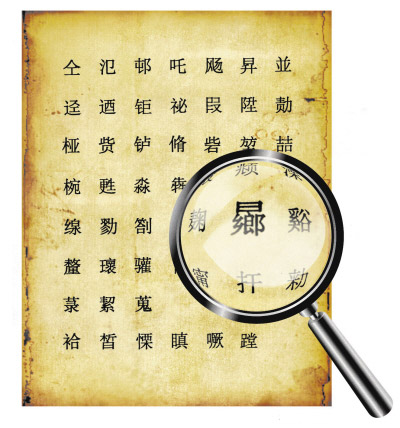Below is a list of the top ten strangest characters that even most natives have a hard time deciphering. Do you know the pronunciation and meanings of these unusual Chinese characters? If you know five and more of these characters, you're better than most Chinese natives!

1) The most provocative character “姦”(jian)
This character is pronounced like the other character “奸” and is its variant form. In fact, “姦” literally translates to mean “private” (私or si) or “privately enjoying oneself” (窃 or qie). There's an old Chinese saying that describes how the character is constructed to mean “three women sharing the same stage in performance” - very provocative indeed.
2) The most sleek character “鱻”(xian)
This character is constructed with three “鱼” or fishes in a pyramid form and is pronounced as “xian” or “鲜” (fresh) and is also a variant of the character “鲜” (fresh). It literally translates as “fresh” (新鲜 or xin xian) or “bright and beautiful” (明丽 or mingli), to mean something (usually foodstuff) as being fresh and of the season.
3) The most clamoring character “猋” (biao)
This is a character constructed of three “犬” or dogs in a pyramid and is a pictograph – signifying dogs running or better yet running speedily and rising ever higher.
4) The character with the most antlers “麤” (cui)
This character shares the same pronunciation as “粗” and is also its variant. From how it is constructed, we can tell that it is one big deer and two little deers at the bottom, with their antlers interlocked. One would guess that it means to have great strength. In fact it only means “to get physical and violent” or “动粗”(dong cu).
5) The character with the most animals “羴” (shan)
This character has three 羊 (yang) or sheep/goats stacked into a pyramid form. It shares the same pronunciation as “膻” and is also its variant. Wonders what it would smell like if you walked into a sheep pen one day? It'd reek of animal stink of course!
There's a Chinese four-character idiom (趋腥附膻) that translates as “there's a riff of animal meat being cooked, in particular that of mutton”, and “膻” here means “the smell of mutton”.
6) The most sensitive character “毳”(cui)
Three “毛” or strands of hair means literally that – hair. There is a medical term in Chinese “毳毛 ”(cui mao) and it refers to soft and fine hair on the human body besides scalp hair, pubic hair, and underarm hair. The fine hairs that cover our bodies are very sensitive to temperature change in the environment and can help us distinguish hot from cold – our metabolisms are thus adjusted accordingly.
7) The most cruel character “蛊” (gu)
People in the past were purported to concoct toxins by gathering poisonous bugs together in one container and have them release their venom in attacking one another. After the bugs were all killed, what was left could only be the most venomous of poisons, which is called “蛊”.
8) The most expensive character “赑” (bi)
“贝” (bei) is a character that is used to signify money in the old days; and since the character above has three “贝” (money) stacked together, it can only mean having stacks of money – which in turn takes much tedious effort to achieve; so “赑”(bi) means “tedious”, as in tedious efforts at striving to earn wealth and fame.
9) The most soiled character “垚” (rao)
This character is used to describe high peaks and mountains. It is no accident that the five elements of nature and so named in the Chinese philosophy – gold (金), wood (木), water (水), fire (火), and soil (土) – could all be stacked three into a pyramid to make a brand new Chinese character; and as such three times soil (土) may be a bit more soil than one would've liked, but it means great peaks and towering mountains.
10) The character with the most strength “犇” (ben)
It shares the same pronunciation with the character “奔”, which means to run, and is also its variant. This character is constructed of three (牛) or oxen and signifies great strength, but in truth, the character means “to run hurriedly”.
Source: gcpnews.com
***
Related Links:
New Chinese Characters Taking the Internet by Storm
The Future of Chinese Characters
The 7 Hurdles in Mastering Chinese
Warning:The use of any news and articles published on eChinacities.com without written permission from eChinacities.com constitutes copyright infringement, and legal action can be taken.
All comments are subject to moderation by eChinacities.com staff. Because we wish to encourage healthy and productive dialogue we ask that all comments remain polite, free of profanity or name calling, and relevant to the original post and subsequent discussion. Comments will not be deleted because of the viewpoints they express, only if the mode of expression itself is inappropriate.
Please login to add a comment. Click here to login immediately.